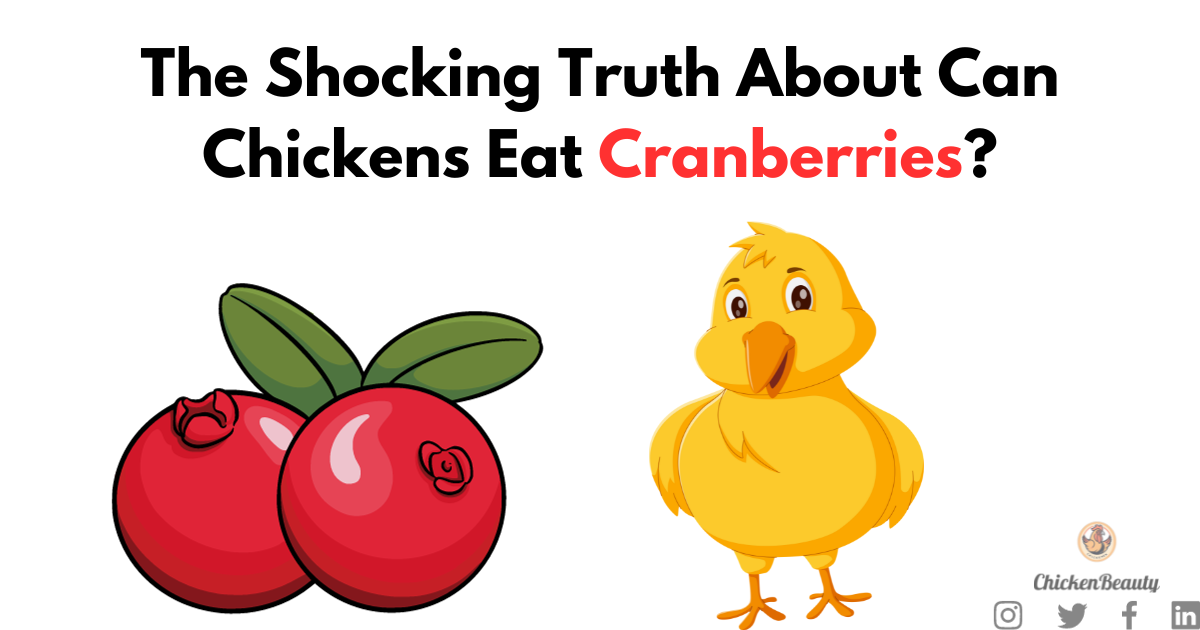Can Chickens Eat Cranberries Hey there, poultry pals and feathered friends! If you’ve ever wondered whether your cluckers can indulge in some cranberry goodness, you’ve come to the right coop. We’re here to unravel the mysteries of can chickens eat cranberries, and we promise not to feather around the bush!
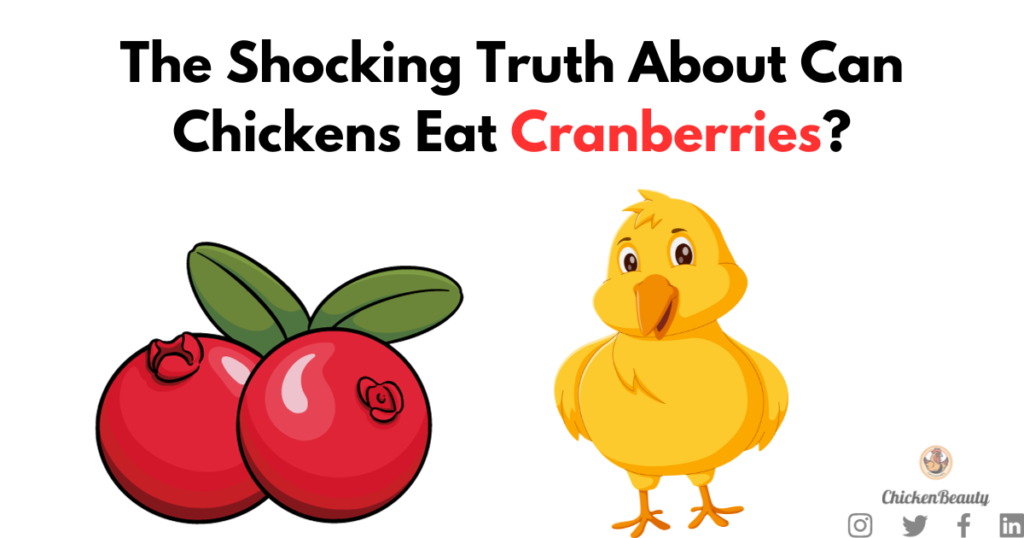
Nutritional Value of Cranberries
Cranberries are a nutritious fruit known for their unique tart flavour. They offer a range of health benefits due to their rich nutritional content. Here is the approximate nutritional value of cranberries per 100 grams (3.5 ounces) of raw, fresh cranberries:
Calories: 46 calories
Carbohydrates: 12.2 grams
Dietary Fiber: 4.6 grams
Sugars: 4 grams
Protein: 0.4 grams
Fat: 0.1 grams
Vitamins and Minerals:
Vitamin C: 14.6 milligrams (24% of the recommended daily intake)
Vitamin E: 1.2 milligrams (6% of the recommended daily intake)
Vitamin K: 5.1 micrograms (6% of the recommended daily intake)
Vitamin A: 60 International Units (1% of the recommended daily intake)
Potassium: 85 milligrams
Manganese: 0.4 milligrams (18% of the recommended daily intake)
Copper: 0.1 milligrams (3% of the recommended daily intake)
It’s important to note that the nutritional content of cranberries can vary slightly depending on factors such as their ripeness and how they are prepared (fresh, dried, juiced, or in sauce). While cranberries can be a healthy addition to your diet, be mindful of added sugars if you consume cranberry products like cranberry sauce or sweetened cranberry juice, as these can significantly increase the calorie and sugar content.
Understanding Chickens’ Diet
Understanding a chicken’s diet is essential for keeping them healthy and productive. Chickens, like any other animals, have specific nutritional requirements that must be met for them to thrive. Here are the key aspects to consider when it comes to understanding a chicken’s diet:
Basic Nutritional Needs:
Protein: Chickens require protein for growth, feather development, and egg production. Young chicks need higher protein levels (18-20%), while adult chickens need around 16-18% protein.
Carbohydrates: Carbohydrates provide energy. Corn and grains are common carbohydrate sources.
Fats: Fats are a concentrated source of energy and help with nutrient absorption. Fats should make up about 3-5% of their diet.
Vitamins and Minerals: Chickens need various vitamins and minerals like calcium, phosphorus, vitamin D, and others for bone health, eggshell formation, and overall well-being.
Water: Access to clean, fresh water is crucial for digestion and overall health.
Complete Poultry Feed: Commercially available poultry feeds are formulated to meet chickens’ nutritional needs at different life stages. There are three main types:
Starter Feed: For young chicks (up to 6-8 weeks).
Grower Feed: For adolescent chickens (6-20 weeks).
Layer Feed: For adult hens producing eggs. It contains extra calcium for eggshell formation.
Supplements: While poultry feed provides balanced nutrition, chickens can benefit from occasional supplements and treats, such as:
Fruits and Vegetables: Chickens can eat a variety of fruits and veggies, like leafy greens, carrots, and apples.
Insects and Grubs: These are a natural protein source and can be obtained by allowing chickens to forage or providing mealworms and black soldier fly larvae.
Oyster Shell or Grit: Oyster shell provides extra calcium for layers, while grit aids in digestion by helping chickens grind down their food in their gizzard.
Foraging: Chickens are natural foragers and enjoy scratching in the soil for insects, seeds, and plants. If you have space, allowing them to forage can supplement their diet and provide mental stimulation.
Avoid Toxic Foods
Be aware of foods that are toxic to chickens, such as chocolate, avocado, and certain plants. These can be harmful or even fatal if consumed.
Seasonal Considerations: Dietary needs may vary with the seasons. In colder weather, chickens may require more energy to stay warm, so their feed may need adjustment.
Water: Access to clean, fresh water is crucial. Chickens can drink a surprising amount of water, especially in hot weather or when laying eggs.
Remember that the specific nutritional requirements of chickens can vary depending on factors like their age, breed, and purpose (meat production, egg laying, or dual-purpose). Always consult with a poultry nutritionist or veterinarian if you have specific questions or concerns about your chickens’ diet to ensure they are getting the best nutrition possible.
Can Chickens Eat Cranberries?
Yes, chickens can eat cranberries in moderation. Cranberries are a nutritious fruit that can be a healthy addition to a chicken’s diet as an occasional treat. They are a good source of vitamins, especially vitamin C, and antioxidants. However, cranberries should only be given to chickens as a small part of their diet and not as a primary food source.
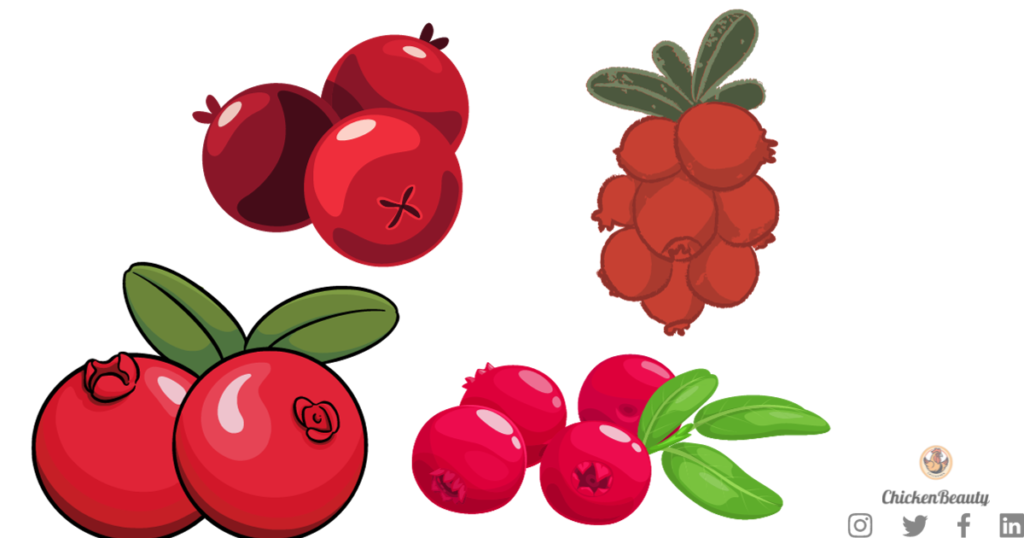
Here are some guidelines for feeding cranberries to chickens:
Moderation: Treats like cranberries should make up only a small portion of a chicken’s diet, ideally less than 10% of their daily food intake.
Fresh or Dried: You can feed chickens fresh cranberries when they are in season, or dried cranberries as a year-round option. Just be sure that dried cranberries do not contain added sugars or artificial flavourings, as these can be harmful to chickens.
Chopped or Whole: You can either chop cranberries into smaller pieces or offer them whole. Some chickens may prefer smaller pieces, making it easier for them to eat.
Benefits: Cranberries are known for their potential health benefits, including supporting the urinary tract health of chickens. They can also provide a variety of vitamins and antioxidants. Avoid Moldy or Spoiled Cranberries: Only offer fresh or dried cranberries that are in good condition. Mouldy or spoiled cranberries can be harmful to chickens. If you’re introducing cranberries to your chickens for the first time, do so gradually to ensure they tolerate them well without any adverse reactions.
Remember that while treats like cranberries can be a fun addition to your chickens’ diet, their primary food should consist of a balanced poultry feed that meets their nutritional needs. A good-quality chicken feed should provide the essential nutrients and vitamins necessary for their overall health and egg production.
Can chickens eat dried Cranberries
Yes, chickens can eat dried cranberries in moderation as an occasional treat. Dried cranberries are not toxic to chickens and can be a source of dietary variety. However, they should only be given as a supplement to their regular diet, which primarily consists of chicken feed that provides them with essential nutrients.
Keep in mind the following guidelines when feeding dried cranberries or any other treats to chickens:
Variety: Chickens benefit from a diverse diet, so it’s good to provide them with various treats and scraps, including fruits and vegetables, in addition to their regular feed.
Fresh Water: Always ensure your chickens have access to fresh, clean water.
Avoid Sugary Varieties: Be cautious about giving dried cranberries that are coated in sugar or syrup, as excess sugar is not healthy for chickens.
Monitor Behaviour: Observe your chickens after introducing new treats to ensure they are not having adverse reactions or digestive issues.
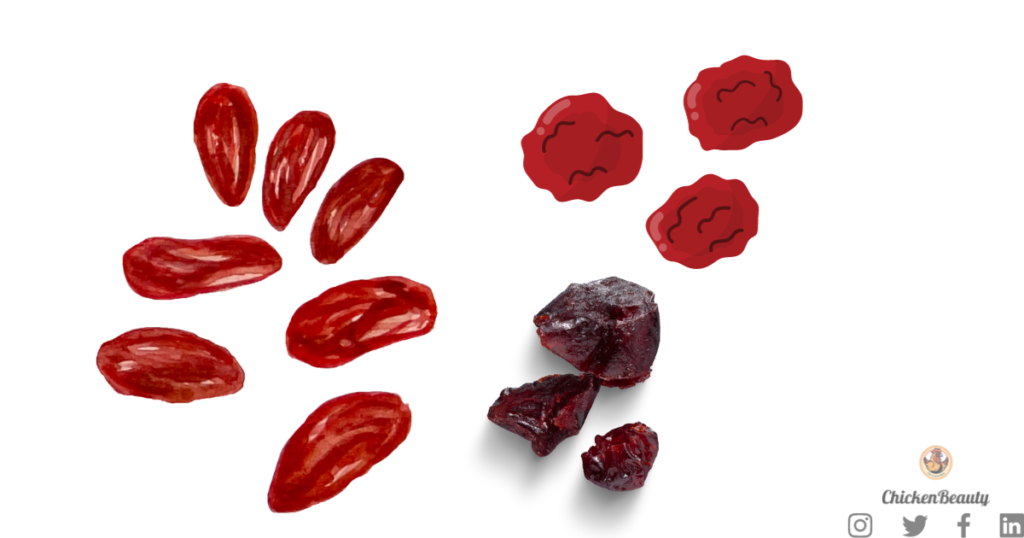
Can Chickens Eat Cranberries Remember that the primary source of nutrition for chickens should be a balanced chicken feed formulated for their specific needs. Treats like dried cranberries should be given in moderation and as an occasional supplement rather than a significant part of their diet.
ALSO READ 👇
Can Chickens Eat Tomato Leaves? A Clucking Good Question!
Chickens and Green Tomatoes: Can Chickens Eat Green Tomatoes?
Can Chickens Eat Cherry Tomatos?
Can Chickens Eat Oranges? The Surprising Truth Revealed!
Unlock the Hidden Power of Chicken Feet Health Benefits
Feathered Foodies: Can Chickens Eat Carrot Tops?
How Long do Chickens Sleep? The Surprising Truth
Can chickens eat Cranberry
Can Chickens Eat Cranberries Yes, chickens can eat cranberries. Cranberries are not toxic to chickens and can be a healthy addition to their diet when given as a treat. However, like all treats, cranberries should be fed in moderation and should not make up a significant portion of a chicken’s diet.
Cranberries are rich in vitamins and antioxidants, which can be beneficial for chickens. They can be fed fresh, frozen, or dried. Fresh or frozen cranberries can be chopped or mashed to make it easier for chickens to eat. Dried cranberries should be given sparingly as they often contain added sugars and preservatives, which are not ideal for chickens.
Remember that treats like cranberries should be part of a balanced diet for chickens, and the majority of their diet should consist of a good-quality poultry feed formulated for their nutritional needs. Additionally, always make sure that any treats or foods you give your chickens are clean and free from mould or spoilage.
Can Chickens eat Cranberry Sauce
Chickens can eat cranberries in moderation, but cranberry sauce, which is typically made with added sugar and spices, is not the best option for them. Chickens have a relatively simple digestive system, and sugary or highly processed foods like cranberry sauce can be harmful to their health in large quantities.
If you want to offer cranberries to your chickens, it’s better to give them fresh or frozen cranberries without any added sugar or seasonings. Fresh cranberries can be a healthy and nutritious treat when provided in small amounts as part of a balanced diet. Just remember to chop them into smaller pieces to make it easier for the chickens to eat.
Always monitor your chickens when introducing new foods, and ensure that treats like cranberries are given in moderation. The bulk of their diet should consist of a high-quality chicken feed to provide them with the necessary nutrients for optimal health and egg production.
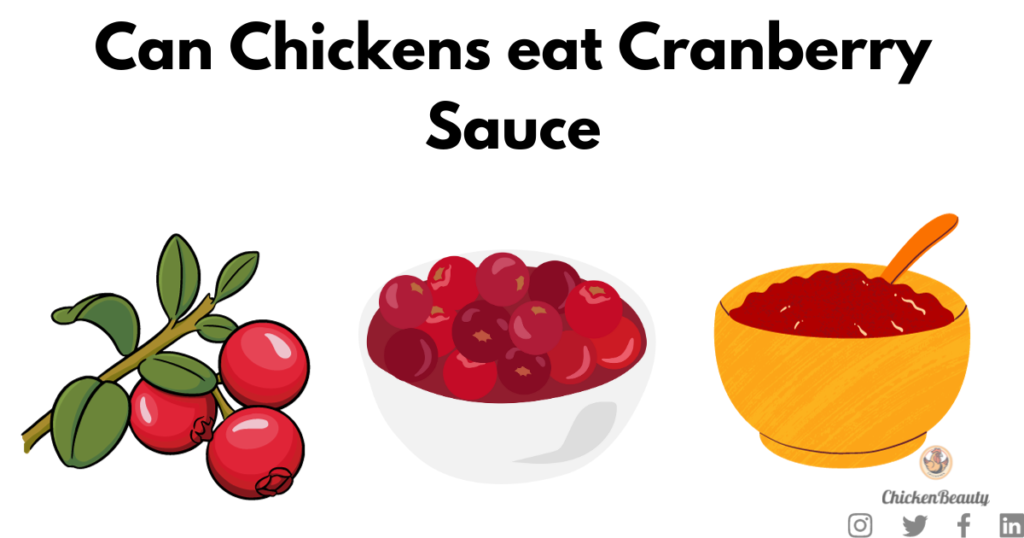
can chickens eat fresh cranberries
Yes, chickens can eat fresh cranberries. Fresh cranberries can be a healthy and nutritious treat for chickens when provided as part of a balanced diet. They are a good source of vitamins, minerals, and antioxidants.
When giving cranberries to chickens, it’s a good idea to chop them into smaller pieces to make it easier for the chickens to eat. You can offer cranberries as an occasional treat, but the bulk of their diet should consist of a high-quality chicken feed to ensure they receive the necessary nutrients for optimal health and egg production.
Always monitor your chickens when introducing new foods, and ensure that treats like cranberries are given in moderation to maintain a well-balanced diet.
Benefits of Feeding Cranberries to Chickens
Can Chickens Eat Cranberries Feeding cranberries to chickens can offer several benefits as part of their diet. However, it’s essential to provide them in moderation and as a treat, rather than a primary source of nutrition. Here are some of the benefits:
Nutritional Variety: Cranberries provide chickens with a different set of nutrients compared to their regular feed. They contain vitamins (such as vitamin C), minerals (like manganese), and antioxidants, which can contribute to overall health.
Immune Support: Cranberries are rich in antioxidants, particularly flavonoids and polyphenols, which may help support the immune system of chickens. A robust immune system can help protect chickens from diseases.
Urinary Health: Cranberries are known for their ability to prevent urinary tract infections in humans by preventing bacteria from adhering to the urinary tract lining. While this may not be as relevant for chickens, it’s possible that cranberries could support urinary health in birds.
Enhanced Egg Yolk Colour: Feeding cranberries to chickens occasionally may result in deeper-coloured egg yolks. This can be appealing to some consumers, as vibrant egg yolks are often associated with better nutritional value.
Taste and Enrichment: Chickens can enjoy the taste of cranberries as a treat, which can serve as a source of environmental enrichment, preventing boredom and encouraging natural foraging behaviour.
Fresh or dried cranberries can be provided, but they should be chopped or broken into smaller pieces to make them easier for chickens to eat. Additionally, avoid giving cranberries with added sugars or artificial flavourings.
While cranberries can be a nutritious and enjoyable treat for chickens, they should not replace their regular feed, which is carefully formulated to meet their specific dietary needs. Always ensure that the majority of their diet consists of high-quality poultry feed and fresh water.
How to Feed Cranberries to Chickens Safely
Feeding cranberries to chickens can be a safe and enjoyable addition to their diet when done correctly. Here are some guidelines on how to feed cranberries to chickens safely Can Chickens Eat Cranberries:
Use Fresh or Dried Cranberries: Fresh cranberries or dried cranberries without added sugars or artificial flavourings are suitable for chickens. Avoid canned cranberry products as they often contain added sugars or preservatives.
Chop or Break Them Up: Cranberries are relatively large and hard for chickens to swallow whole. Chop or break them into smaller, more manageable pieces. This not only makes it easier for chickens to eat but also reduces the risk of choking.
Moderation is Key: Cranberries should be offered as an occasional treat and not as a primary food source. Too many cranberries can disrupt the balance of a chicken’s diet. A small handful for a flock is generally sufficient.
Mix with Regular Feed: To encourage chickens to eat the cranberries and ensure they don’t pick out only the treats, mix the cranberries with their regular feed. This will help them get used to the taste and texture of cranberries while ensuring they still consume their balanced diet.
Ensure Fresh Water: Always provide fresh, clean water alongside any treats, including cranberries. The additional dry matter in cranberries may make chickens thirstier, so having water readily available is essential.
Watch for Overindulgence: Chickens can overeat treats if given the opportunity, leading to obesity and other health issues. Monitor their intake of cranberries, and if you notice any digestive problems, reduce or eliminate cranberries from their diet.
Rotate Treats: Variety in treats is essential to maintain a balanced diet for your chickens. Instead of feeding cranberries exclusively, consider rotating them with other safe treats like vegetables, fruits, or mealworms.
Avoid Mouldy Cranberries: Check the cranberries for signs of mould or spoilage before feeding them to chickens. Mouldy food can be toxic and harmful to chickens.
Know Your Chickens: Pay attention to your chickens’ preferences and any adverse reactions. Some chickens may love cranberries, while others may not be interested. If any chickens experience digestive issues or adverse reactions, discontinue feeding them cranberries.
Consider Frozen Cranberries: During hot weather, you can freeze cranberries before offering them to chickens. The cold treat can be refreshing, and it can also slow down their consumption, preventing overindulgence.
Remember that treats, including cranberries, should make up only a small portion of your chickens’ diet. Their primary nutrition should come from a well-balanced commercial poultry feed formulated for their specific needs. Providing treats in moderation and following these guidelines will help keep your chickens healthy and happy.
Other Fruits and Foods for Chickens
Here are some other fruits and foods that are generally safe for chickens to enjoy:
Grapes: Grapes are a popular treat for chickens, but they should be cut in half to prevent choking hazards, especially for smaller chicken breeds.
Mealworms: Mealworms are high in protein and a favourite treat for chickens. They can be offered live, dried, or roasted. They make an excellent source of protein for growing chicks and moulting hens.
Oats: Rolled oats are a good source of energy for chickens. You can scatter them on the ground for your chickens to scratch and peck at.
Corn: Whole or cracked corn can be given as a treat. Corn can be high in calories, so it’s best to offer it in moderation.
Pumpkin and Squash: Chickens can eat pumpkin and squash seeds, flesh, and skin. These foods are not only nutritious but can also help with natural deworming.
Bread and Cereal: Stale bread or cereal can be offered occasionally, but it should not be a significant part of their diet due to its low nutritional value.
Cheese and Yogurt: These dairy products can be offered in small amounts for an extra protein and calcium boost. Make sure the dairy products are plain and unsweetened.
Rice and Pasta: Cooked rice and pasta are safe treats. They can be an excellent way to use up leftovers.
Can Chickens Eat Cranberries Remember that while these treats can be healthy and enjoyable for chickens, they should make up no more than 10% of their overall diet. Providing a balanced commercial poultry feed should be their primary source of nutrition. Also, observe your chickens to ensure they tolerate these treats well, as individual birds may have different preferences and tolerances.
In Conclusion, Can Chickens Eat Cranberries
So, there you have it, folks – the mystery of can chickens eat cranberries is solved! Chickens can indeed munch on these tangy little wonders, but it’s best to offer them in moderation. Your cluckers will thank you for the berrylicious treat, and your coop will be the talk of the town!
Remember, keep it simple, keep it moderate, and keep those feathers fluffed. Happy cranberry snacking, feathered friends!
(FAQs) About Can Chickens Eat Cranberries
Can chickens eat cranberries?
Yes, chickens can eat cranberries in moderation. Cranberries are generally safe for chickens and can be a healthy addition to their diet.
Are cranberries nutritious for chickens?
Yes, cranberries are nutritious for chickens. They are rich in vitamins, antioxidants, and fiber, which can be beneficial for your chickens’ overall health.
How should I feed cranberries to my chickens?
You can feed cranberries to your chickens in various ways. You can offer them fresh cranberries, dried cranberries, or even cranberry sauce in small quantities as treats. Make sure to chop fresh cranberries into smaller pieces to prevent choking hazards.
Are there any risks associated with feeding cranberries to chickens?
While cranberries are generally safe for chickens, they should be given in moderation. Excessive consumption can lead to digestive upset due to their tartness. Also, avoid giving cranberries with added sugar or sweeteners.
Can cranberries be used as a natural wormer for chickens?
Cranberries are often believed to have natural antibacterial properties, but they are not a substitute for a proper deworming program for chickens. Always consult with a veterinarian for the best practices in maintaining your chickens’ health.
How often should I give cranberries to my chickens?
Cranberries should be given as an occasional treat and not a staple in your chickens’ diet. Offer them a small amount a few times a week, but do not overdo it.

